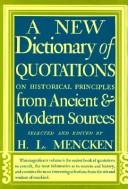 In today’s Wall Street Journal “Sightings” column I mark the seventieth birthday of one of my all-time favorite reference books, H.L. Mencken’s New Dictionary of Quotations. Here’s an excerpt.
In today’s Wall Street Journal “Sightings” column I mark the seventieth birthday of one of my all-time favorite reference books, H.L. Mencken’s New Dictionary of Quotations. Here’s an excerpt.
* * *
Nobody reads a reference book to be amused, much less charmed. Useful though they are, the vast majority of dictionaries and encyclopedias are poker-faced pieces of work that stick to the facts and present them as soberly–and unstylishly–as possible. One of the reasons why this is so is that such books tend to be written not by individuals but by panels of experts. Try to imagine a joke written by a committee and you’ll get the idea.
Fortunately, there are a handful of shining exceptions to this drab rule, the gaudiest of which is H.L. Mencken’s “New Dictionary of Quotations on Historical Principles from Ancient and Modern Sources,” a million-word monster (the original manuscript weighed 35 pounds) that is celebrating its seventieth birthday this summer….
 Painstakingly organized and cross-referenced by subject, with each entry arranged in chronological order by date of original publication, the “New Dictionary” is formidably wide-ranging. Indeed, the only major writer missing from its index is Mencken himself. (“I thought it would be unseemly to quote myself,” he told a curious reporter. “I leave that to the intelligence of posterity.”) Its 1,347 pages abound with such innocent-sounding rubrics as “Civilization,” “Flag, American,” “Hell,” “Hypocrisy,” “Old and New” and “Science and Religion.” At first glance you might mistake it for a cornucopia of the world’s wisdom–but don’t let appearances fool you. The fathomlessly cynical Mencken wisely warned his readers in the preface that the “New Dictionary” was aimed at “readers whose general tastes and ideas approximate my own….The Congressman hunting for platitudes to embellish his eulogy upon a fallen colleague will find relatively little to his purpose.”
Painstakingly organized and cross-referenced by subject, with each entry arranged in chronological order by date of original publication, the “New Dictionary” is formidably wide-ranging. Indeed, the only major writer missing from its index is Mencken himself. (“I thought it would be unseemly to quote myself,” he told a curious reporter. “I leave that to the intelligence of posterity.”) Its 1,347 pages abound with such innocent-sounding rubrics as “Civilization,” “Flag, American,” “Hell,” “Hypocrisy,” “Old and New” and “Science and Religion.” At first glance you might mistake it for a cornucopia of the world’s wisdom–but don’t let appearances fool you. The fathomlessly cynical Mencken wisely warned his readers in the preface that the “New Dictionary” was aimed at “readers whose general tastes and ideas approximate my own….The Congressman hunting for platitudes to embellish his eulogy upon a fallen colleague will find relatively little to his purpose.”
He wasn’t kidding. Look up “Evolution,” for example, and you’ll find this 1925 statement by the Bible-thumping evangelist Billy Sunday: “If a minister believes and teaches evolution, he is a stinking skunk, a hypocrite, and a liar.” Look up “Critic” and you’ll be confronted with a rich catalogue of ripe insults, among them this passage from Samuel Coleridge’s “Modern Critics”: “All enmity, all envy, they disclaim,/Disinterested thieves of our good name:/Cool, sober murderers of their neighbor’s fame.”…
Why all the funny stuff? Mencken said that he wanted “to make the book readable, to give the reader who seeks only entertainment something to content him. There is no reason why a book of quotations should be dull; it has its uses in idleness as well as in study.” I couldn’t agree more, but I suspect that his true purpose was to bolster his own dark skepticism about human nature by showing how widely it has been shared through the ages….
* * *
Read the whole thing here.
Terry Teachout on the arts in New York City
An ArtsJournal Blog
